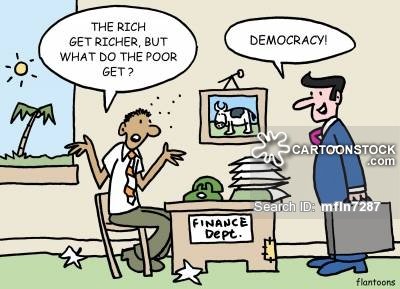... in a voluntarist society.

[cartoonstock.com]
A common criticism of voluntarism is that we require the state to protect us from the tyranny of the rich. In the following I argue that this is based on flawed arguments and that the rich in our current system only get richer because of state interventions.
I will assume that there are (at least) two companies that produce a comparable product and are in completion. In addition I will assume that there are investors willing to fund promising projects.
These two companies are making profit and employing workers. The question is how much of the wealth generated in the companies ends up in the hands of the workers, and how much ends in the hand of the owner.
Lets say that there is a very good worker, for simplicity twice as productive as the average worker. Now it is evident that she can demand twice the salary or leave and be hired by the competing company. We now already have established the simple fact that workers will be paid according to their productivity.
But this does not address the question weather she gets a fair amount of money for her work, or if instead, most earned profits go to the business owner. But we know that if she is not getting her fair amount, then all the other workers in that company will also not get their fair amount, as the workers salary is proportional to their productivity.
If this is the case and the amount of money claimed by the owner is larger than the risk he is taking, the second company can attack the first one by cutting the owners part and produce the product cheaper. Even in the worst case, that there is a cartel of the owners and they do not attack each other on the price, in a free market without artificial entry barriers, the underpaid employees have the opportunity to simply start producing themselves. They already know how the product is made and posses all required skills. The only missing part is capital for which they can find external investors, that charge the interest rate that is adequate to the risk of the project.
So in a free economy, the capital owners can generate wealth, compensating for the risk they are taking (and of course also for innovating and beating the competition in that way). All further profit ends in the hands of the employees and is distributed according to their productivity. All of this without any need for state intervention. This is the magic of real free capitalism.
In order to get rich, you must either work hard, or invest your capital in a smart way and provide better products as your competitors. Owning a lot of capital certainly means that you own a lot of capital, but it does not mean that it will grow continuously.
Have you watched the video where Jordan Peterson talks about even in nature a 1% exists among species? Its just natural for some to produce more than others. If someone wants to be the michael jordan of capitalism, who are you to tell him he can't? (a saying not directed at you)
yes there is of course a 1%. But in order to be that 1% you have to provide services that other people want to buy voluntarily. I see no problem in people being rich, I only see a problem if people are rich at the cost of everyone else.